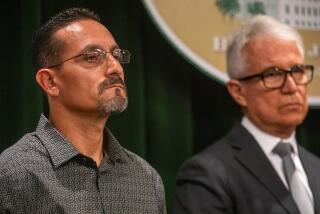Texan wrongly convicted of rape freed after 24 years in prison
HOUSTON — In what’s becoming a familiar scenario in Texas, a man has been freed after spending years behind bars for a crime he did not commit.
David Lee Wiggins, 48, of Fort Worth was imprisoned in 1989 for rape, largely because the 14-year-old victim picked him out of photo and live lineups. His fingerprints did not match any at the crime scene. Still, he was sentenced to life in prison.
But this month DNA testing excluded Wiggins, and on Friday, State District Judge Louis Sturns in Fort Worth approved a motion overturning his conviction and freed him.
Before Wiggins is officially exonerated, the Texas Court of Criminal Appeals must accept the judge’s recommendation or the governor must grant a pardon.
“This was the beginning of the final chapter in his 24-year ordeal: He walked free today,” Wiggin’s attorney, Nina Morrison of the New York-based Innocence Project, told the Los Angeles Times. “He lost half of his life to this wrongful conviction. It’s a startling reminder of the toll it takes.”
Morrison, who attended the hearing, said Wiggins spoke briefly after the judge’s ruling. Wiggins said he was not bitter, she said, and did not blame the victim who mistakenly identified him as her rapist.
Wiggins plans to live with his brother in Texas, said Morrison, whose office has handled his case since 2007. His immediate plans included spending time with family and eating a hamburger.
After the hearing, Wiggins went out to lunch with about 10 former Texas prisoners who had been exonerated. Among them was Michael Morton, who was exonerated in the Austin area last October after serving 25 years for his wife’s 1986 murder. Morton drove to the hearing to stand in solidarity with Wiggins, Morrison said, “to shake his hand and tell him, ‘I’m here for you.’”
For lunch, Wiggins had a hamburger, fries and a Coke.
“He said it was fantastic,” Morrison added.
Morrison said the Tarrant County District Attorney’s Office worked with her from the start, agreeing to DNA testing and acknowledging Wiggins’ innocence.
“If current state-of-the art DNA testing had been available in 1989, there is no doubt Mr. Wiggins would have been acquitted,” Tarrant County Dist. Atty. Joe Shannon said in a statement, adding that his office would continue to cooperate with “legitimate requests” for post-conviction DNA testing.
“The job of this office is not just to convict, but to see that justice is done,” Shannon said.
Wiggins would be the second person to have a conviction overturned by DNA in Tarrant County since Texas legislators passed a law in 2001 allowing inmates to request post-conviction DNA testing. Next door in Dallas County, more than 30 people have had convictions overturned in that time, thanks in part to the Dallas district attorney’s conviction integrity unit.
In Texas, 84 people have been exonerated since 1989, according to the National Registry of Exonerations created by the University of the Michigan Law School and the Center on Wrongful Convictions at Northwestern University School of Law.
After his conviction is formally reversed, Wiggins will be eligible for $80,000 a year in compensation and added benefits that the state provides to those wrongfully convicted.
She said Wiggins talked Friday about fellow inmates he left behind who insist they’re innocent but don’t have DNA evidence to help prove it. He plans to try to help them and other inmates pursuing claims like his, Morrison said.
“He knows in this case the witness made an honest but terrible mistake,” she said, “He’s choosing to look forward and help others.”
ALSO:
Umpire’s quick call credited with saving a life
Video captures fatal shootout between NYC police and gunman
Aurora movie massacre was planned months in advance, prosecutors say
molly.hennessy-fiske@latimes.com
More to Read
Sign up for Essential California
The most important California stories and recommendations in your inbox every morning.
You may occasionally receive promotional content from the Los Angeles Times.











